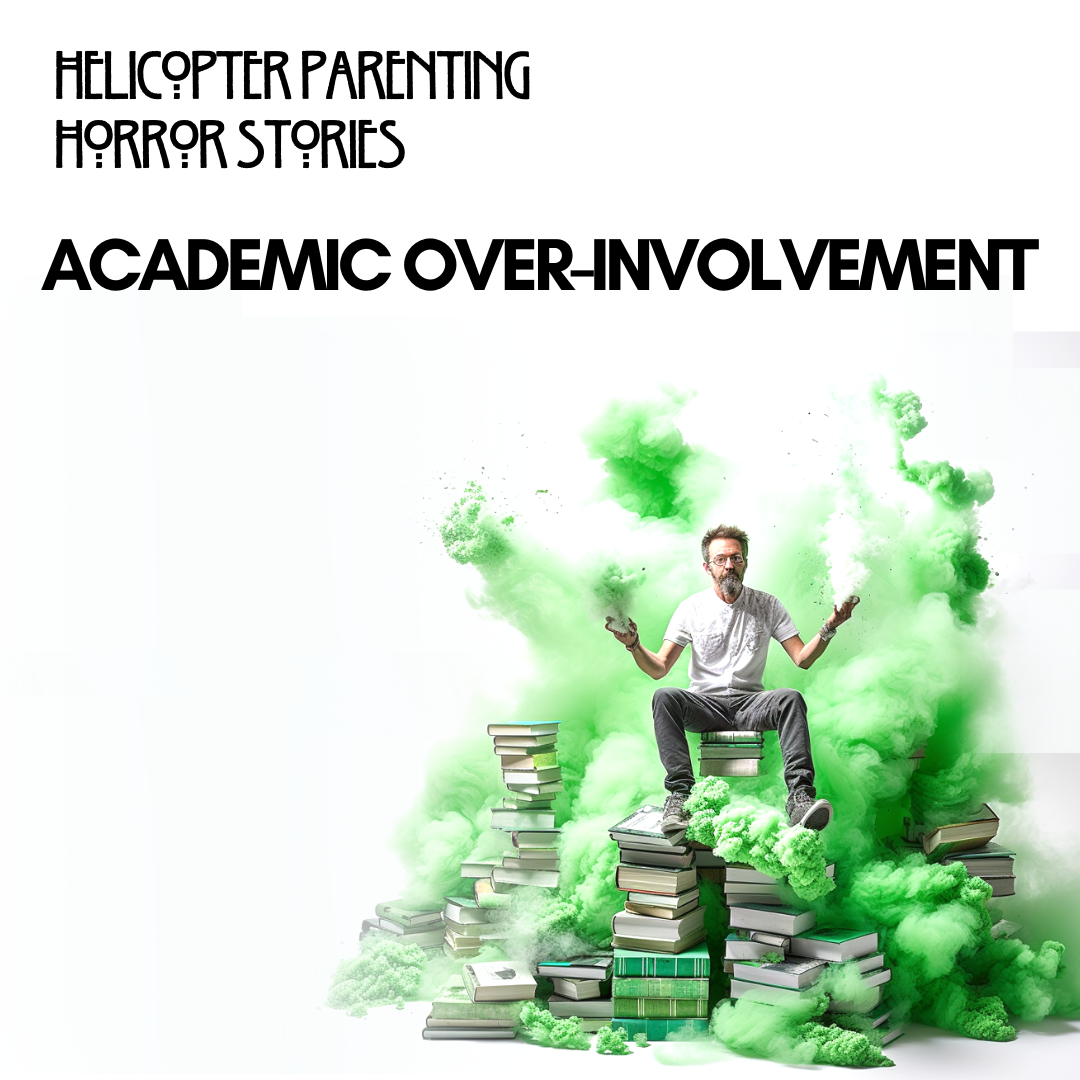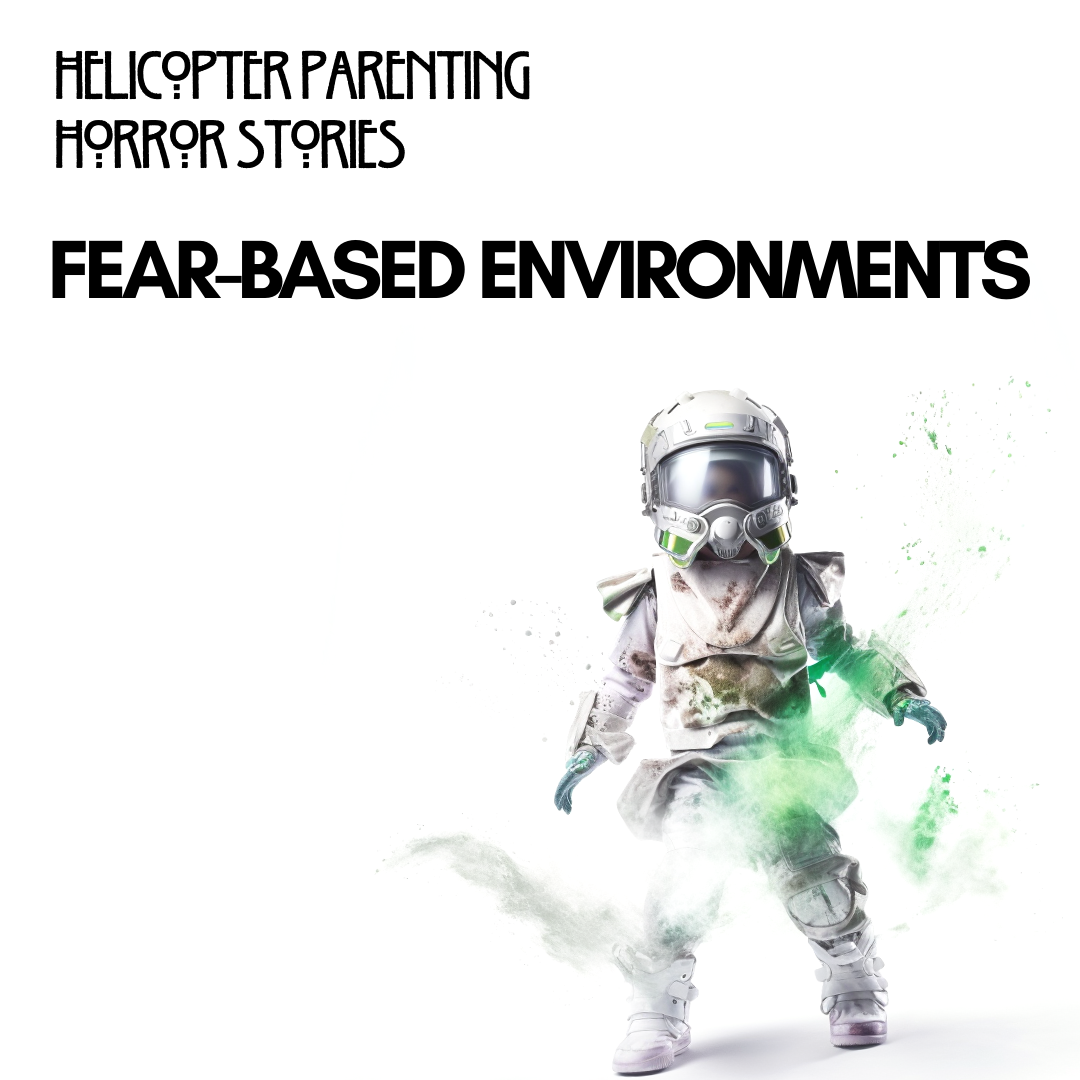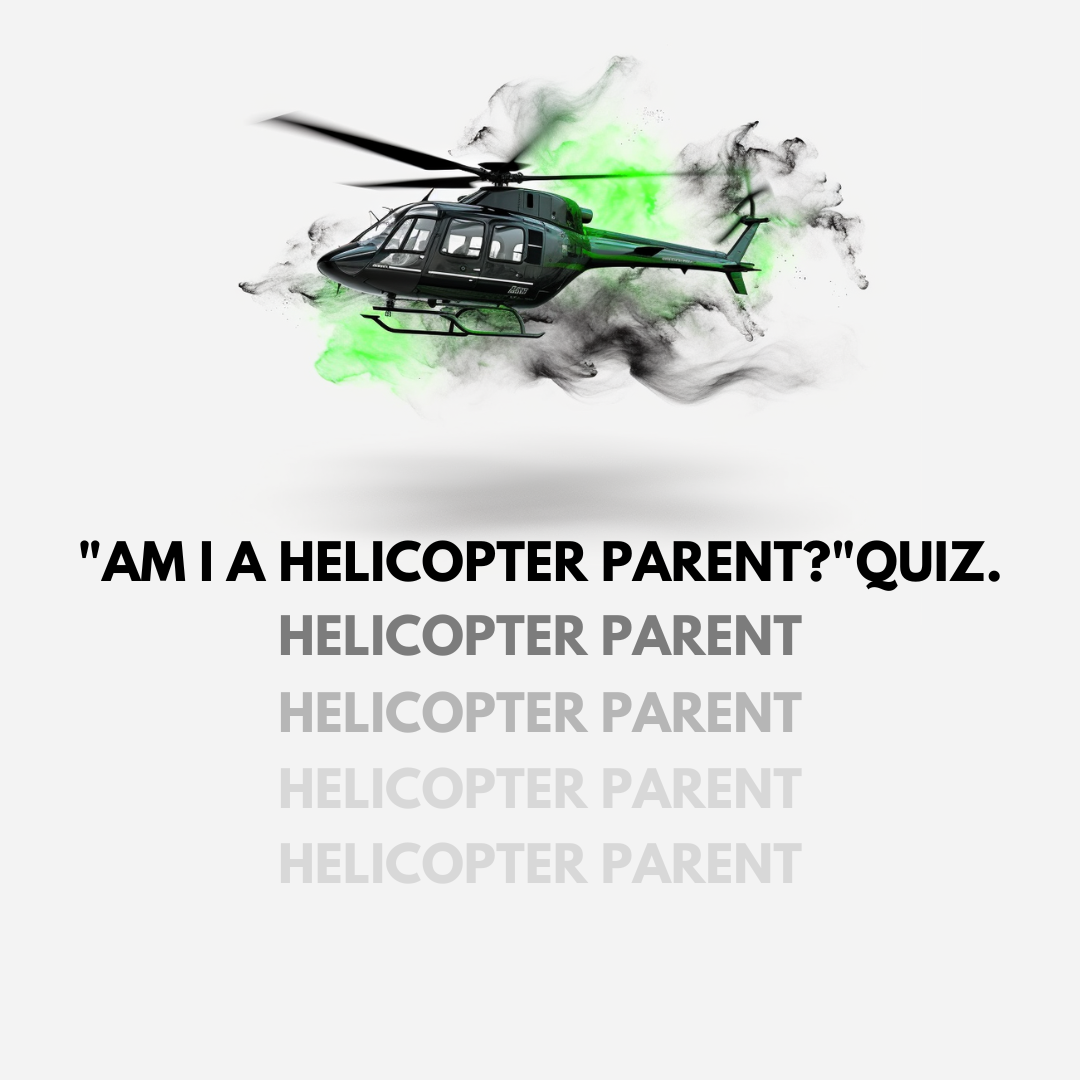Helicopter Parents Stories -Tales of Horror!
Jun 27, 2023
As parents, it's only natural to desire the best for our children and protect them from harm. In our attempts to provide this safety net, some of us might overstep without realizing it, transforming into so-called 'helicopter parents.' This term describes parental behaviors characterized by excessive involvement in a child's life, hovering closely like a helicopter, ready to swoop in at the first sign of trouble. While the intentions are good, overparenting can sometimes have negative impacts on a child's development, especially in terms of self-efficacy, problem-solving skills, and psychological well-being. It's crucial to strike a balance in parental involvement, ensuring we foster independence, resilience, and growth in our children. Let's examine five common characteristics of helicopter parenting - academic involvement, constant supervision, decision-making, overemphasis on safety, and problem-solving - to understand how these can manifest in both healthy and unhealthy ways.
You can find out if you're a helicopter parent by taking our free online quiz, and join the mailing list afterward if you want to learn more about Grounded Parenting: The Anti-Anxiety Parenting Course
What are some typical behaviors of helicopter parents?
Helicopter parents are characterized by their high level of involvement in their children's lives, often bordering on intrusive. The behaviors they typically exhibit encompass several dimensions, including academic over-involvement, constant supervision, decision-making on behalf of the child, over-concern about safety, and solving their child's problems.
- Academic Over-Involvement: Helicopter parents often involve themselves excessively in their child's academic affairs. This could range from micromanaging homework and study schedules, to actively involving themselves in teacher interactions, and even intervening in their child's grades. While these parents might believe that they are promoting academic success, the research suggests that such intense involvement can result in reduced academic efficacy and increased anxiety amongst students (Givertz & Segrin, 2014).

- Constant Supervision: These parents also tend to constantly monitor their children, even into their college years. From tracking their whereabouts to keeping tabs on their daily activities and social interactions, the level of supervision can be exhaustive. While their intentions might stem from care and protection, research by LeMoyne & Buchanan, 2011, and Segrin et al., 2012, indicates that such constant supervision correlates negatively with the child's well-being and may potentially hinder the quality of parent-child communication.
- Making Decisions on Behalf of the Child: Helicopter parents often step in to make decisions for their children, even those concerning significant life choices such as college major selection or career paths. This overbearing approach may unintentionally impinge on the child's sense of autonomy, leading to a higher risk of depression and lower life satisfaction (Schiffrin et al., 2013; LeMoyne & Buchanan, 2011).

- Safety & Fear-Based Homes: An inflated sense of danger and anxiety about safety is another hallmark of helicopter parenting. These parents may excessively restrict their children's activities and experiences under the guise of protecting them from harm. However, this over-concern about safety can limit the child's opportunities for growth, learning, and the development of resilience and coping mechanisms (Reeves & Levin, 2013).
- Solving the Child's Problems: When helicopter parents swoop in to solve their children's problems, they inadvertently rob them of the chance to learn problem-solving skills and build resilience. While solving immediate issues can be tempting, it can hinder the child's ability to handle challenges and stresses later in life, leading to ineffective coping strategies and, possibly, higher anxiety levels (Segrin et al., 2013).
What long-term effects might helicopter parenting have on a child's development?
Unfortunately, there is an increasingly more diverse amount of research and data that seems to show that high-anxiety parenting, or hovering and over-involvement, does have a negative long-term impact on a child's development.
Impaired Problem-Solving Skills: When parents consistently intervene to solve their children's problems, they may prevent their kids from developing essential problem-solving skills. Over time, this can impact their ability to navigate challenges independently, leading to a reliance on others for solutions and potentially contributing to a sense of helplessness in challenging situations (Segrin et al., 2013).
Reduced Self-Efficacy: Studies suggest that excessive parental control and decision-making on behalf of the child can negatively impact a child's belief in their ability to succeed or manage their life, a concept known as self-efficacy (Bradley-Geist & Olson-Buchanan, 2014; Givertz & Segrin, 2014). This can limit their motivation to undertake new tasks, engage in opportunities, and potentially impact their overall success in different life domains.
Increased Risk of Anxiety and Depression: Overbearing parenting styles have been correlated with higher levels of anxiety and depression in children. Over time, these children may struggle with autonomy and feel less competent in handling life and its stressors, increasing their risk of mental health issues (Schiffrin et al., 2013).
Lower Life Satisfaction: Over-controlling parenting practices have also been associated with lower life satisfaction in children. When parents continually make decisions for their children, it can infringe on their psychological needs for autonomy and competence, potentially leading to decreased happiness and fulfillment in life (Schiffrin et al., 2013).
Sense of Entitlement: Constant supervision and over-parenting can sometimes result in children developing a sense of entitlement, as they might come to expect that all of their problems will be solved for them and that they should not have to endure going without what they desire. This was found in the studies by Segrin et al., 2012 which followed the development of young adults into college and beyond.
Weaker Resilience: Children of helicopter parents might not develop the necessary resilience to face life's ups and downs. They may struggle more with setbacks and disappointments as they haven't had the chance to build coping strategies and resilience during their development.
How can parents tell if they are exhibiting helicopter parenting tendencies?
It's sometimes a fine line between being overly involved or toxic and being a good parent, but if you are in touch with your anxiety levels, you might be able to tell if you are being protective or overprotective, and where you are on the line of b
Academic Involvement:
Healthy: Parents encourage academic pursuits, offer help when needed, and show interest in the child's schoolwork. They also allow children to take responsibility for their own education, facilitating learning rather than dictating it.
Unhealthy: Over-involvement might involve regularly contacting teachers to dispute grades, constantly managing the child's homework or projects, or creating an environment where achieving high grades is more important than the learning process. This can lead to pressure, stress, and a lack of self-sufficiency in the child.
Constant Supervision:
Healthy: Knowing where your children are, who they're with, and what they're doing is part of being a responsible parent. It's also crucial to discuss online safety and set appropriate boundaries for internet usage.
Unhealthy: Constant monitoring of the child's activities, including tracking their location excessively or scrutinizing their online activities to an extreme extent, can stifle their independence and contribute to anxiety or distrust.
Decision Making:
Healthy: Guiding and advising your child as they make choices about classes, friends, attire, and hobbies is part of parental guidance. It is important to teach them the process of informed decision making.
Unhealthy: Continually making decisions on your child's behalf, even when they're capable of doing so, robs them of learning essential decision-making skills and may cause them to feel incompetent or dependent.
Overemphasis on Safety:
Healthy: It's a parent's job to keep their children safe. This might involve setting boundaries for risky activities and educating them about potential dangers in an age-appropriate manner.
Unhealthy: An exaggerated focus on safety, where the perceived dangers are relatively low risk, can lead to excessive worry and anxiety in children. Overprotection can limit their experiences and hinder their ability to assess and manage risk independently.
Problem Solving:
Healthy: Parents should help their children navigate challenging situations by offering guidance and advice, encouraging problem-solving skills, and stepping in when necessary for their well-being.
Unhealthy: If parents habitually step in to solve all of their child's problems, it may hinder the development of resilience, critical thinking, and problem-solving skills. Children may come to believe they are incapable of managing difficulties on their own.
In general, how can parents create a healthy balance between healthy and unhealthy levels of involvement for each of these categories?
The key to striking a healthy balance lies in gradually shifting from direct management to a supportive role as children grow, fostering their independence, resilience, and problem-solving abilities. This empowers them to become well-adjusted adults capable of navigating the world on their own.
Academic Involvement: Healthy academic involvement includes engaging in conversations about their studies, providing resources and tools for learning, and supporting their effort rather than focusing solely on their achievement. However, it's important to avoid micromanaging their academic responsibilities or stepping in to negotiate grades or assignments with teachers. Instead, encourage them to take the lead, thereby fostering their problem-solving and advocacy skills.
Constant Supervision: While it's necessary to supervise younger children for safety, it's equally crucial to provide them with chances for independent play and exploration. As children grow older, this shifts into a respect for their privacy and autonomy. Keep an open line of communication and show interest in their activities, but avoid prying excessively into every detail of their life.
Making Decisions on Their Behalf: Guiding children in their decision-making process is essential, particularly when it comes to significant life choices. However, instead of dictating decisions, help them evaluate options, consider consequences, and arrive at their own conclusions. As they mature, they should be entrusted with progressively more significant decisions, preparing them for the independence of adulthood.
Over-concern About Safety: Ensuring the safety of children is paramount, but an overemphasis on safety can hinder their ability to assess and manage risks independently. Encourage safe exploration, outdoor play, and age-appropriate activities that foster resilience and resourcefulness. Teach them about safety measures instead of completely isolating them from all potential hazards.
Solving Their Problems: It's important to empathize with your child's struggles and provide guidance when they face difficulties. However, consistently solving problems on their behalf can impede the development of their problem-solving skills. Instead of immediately stepping in, encourage them to think through solutions, providing support and guidance as needed. This approach fosters resilience and builds their confidence in navigating life's challenges.


